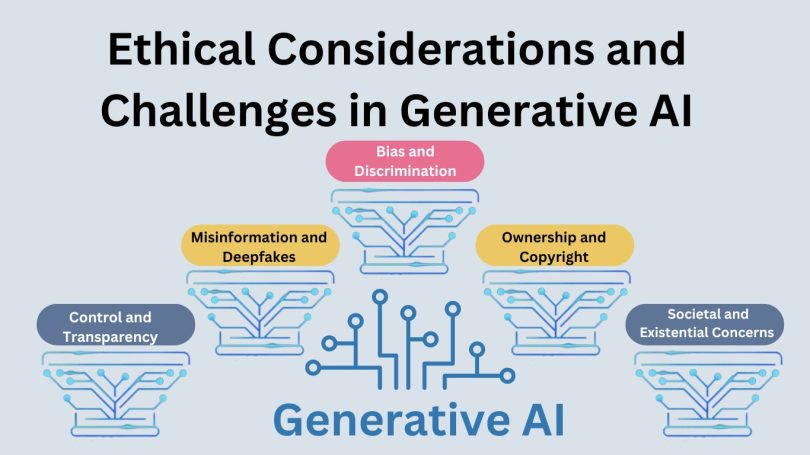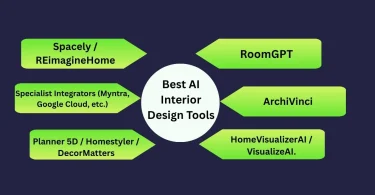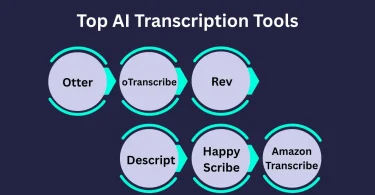AI is a rapidly evolving field, especially generative AI that has brought about many developments in the generation of content, text, images and music. However, the fast advancement of telemedicine has brought different ethical issues and concerns into the limelight. In the future development of this field, it is necessary to seek some equilibrium between the introduction of new ideas and the consequent obligations.
Due to its capability of generating new and realistic data, generative AI can be a game changer in many fields. However, it is essential to note that this power is not without critical ethical implications and issues that need to be addressed.
Moral Considerations and Challenges in Generative AI:
Bias and Discrimination:
The generative AI models are trained on data; therefore, the quality of the data that feeds the models determines the quality of the AI models. Consider an AI that produces racist or sexist content due to training with a lot of such examples.
If there is a bias in the data, then the generative AI models employed in hiring or loan disbursement will amplify the bias present in society.
Misinformation and Deepfakes:
This AI can be abused to produce believable fake news, articles, social media posts (fake news) or realistic videos (deep fakes) to influence people’s opinion or cause division.
Deepfakes can deceive the audience into believing fake content is real news, hence making the public lose confidence in genuine news sources and media.
Ownership and Copyright:
Who Owns the Creation?
With the advancement in generative AI models, there is an emergence of the ownership of copyright in the generative models’ output. Is it the programmer, the user who is the source of the question for the AI or the AI itself?
If generative AI can create music or art that is as good as a human, then how will the artists be paid for their work and how will one differentiate between original work and work done by generative AI?
The above questions must be solved.
Control and Transparency:
Most of the generative AI models are black box systems, meaning that the inner workings of the models especially the generative models are not easily understandable. Such lack of disclosure can be associated with accountability issues and even manipulation of the results.
That is why, as AI becomes increasingly generative, it becomes pertinent to ask how much say humans should have in the decision-making process.
The key is to find the right balance of how much human intervention is necessary and how much of it should be left to the AI.
Societal and Existential Concerns:
Job displacement by AI: The concept of generative AI is that it can automate most creative professions, and discussions about the elimination of most jobs and the need to retrain the workforce.
Existential Risks: Certain scholars are concerned that existential threats may emerge if generative AI systems become more sophisticated than the humans who manage them and acquire aims of their own. Although this may sound rather unrealistic, such discussions have to continue.
Addressing the Challenges:
It AI has the potential to bring about a tremendous amount of worth/good in the world.
Here are some ways to address these concerns…
Developing Ethical Guidelines: To gain a better understanding of the possible ethical concerns that may arise in the future, further cooperation between researchers, policymakers and industry specialists is required to define the proper ethical standards for applying generative AI.
Promoting Diversity and Inclusion: It is necessary to mention that diverse training data and development teams are also significant to avoid bias and achieve fairness in AI results.
Transparency and Explainability: There is a need to ensure that the AI models used are more transparent and the users can be able to explain how the models arrived at the output.
Human-Centered AI Design: AI should be created in a way that enhances the quality of human life instead of replacing it with the help of generative AI.
It is only through cooperation that the further development of generative AI will be built upon the foundations of the solution to these ethical problems.
Through the promotion of the culture of open debate, the creation of ethical guidelines for the use of AI, and the focus on humanist values, it is possible to guarantee that this technology will be used to the greatest advantage of humanity.
Conclusion:
AI has the possibility of being generative, yet it has large ethical implications. Some of the challenges that need to be addressed include; bias, fake news and ownership of the technology for the benefit of the society. This article is informative and can only be used as a starting point for further research. It allows us to explore more about certain issues, present its proper use, and incorporate more people’s opinions. In this way, this can turn into a practical and continuous tool for creating a responsible and positive future for generative AI.



